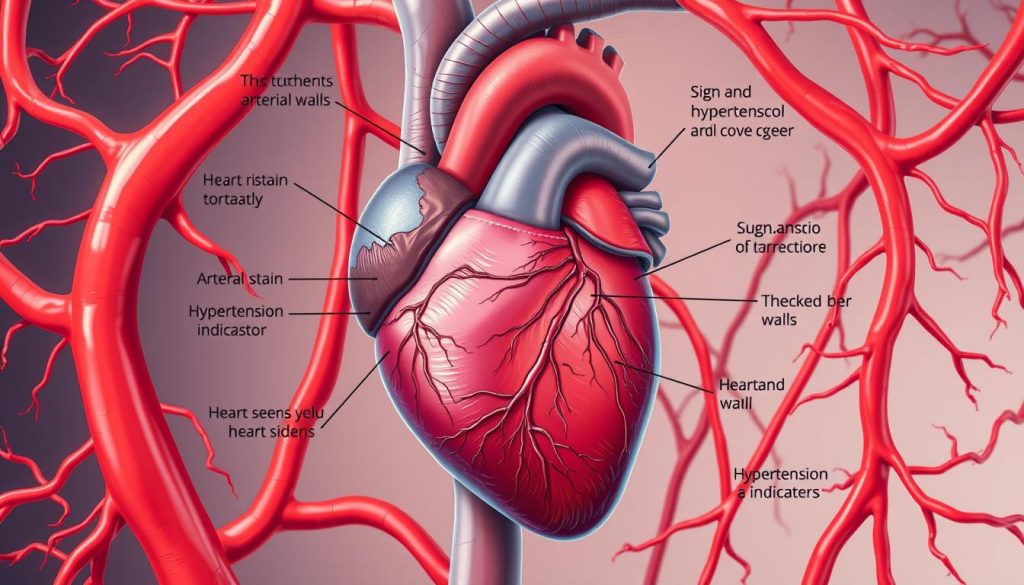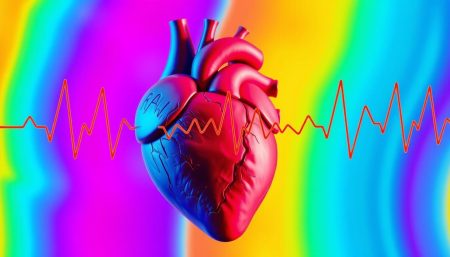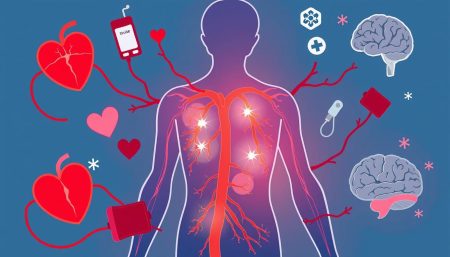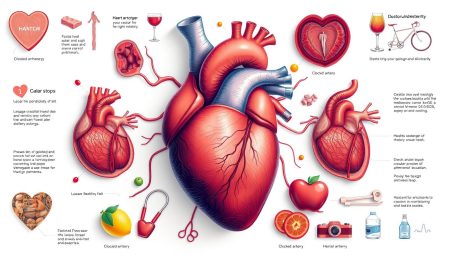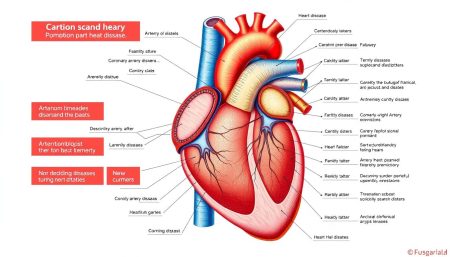Hypertensive cardiovascular disease is a serious health issue affecting millions in the U.S. It happens when high blood pressure damages the heart and blood vessels over time. It’s important for those at risk or already diagnosed to understand this condition.
This guide will show how high blood pressure can cause heart problems. We’ll cover the causes, symptoms, and treatment options. This will help readers take charge of their heart health.
By the end of this guide, you’ll know how to manage hypertensive cardiovascular disease. You’ll also learn how to protect your heart from high blood pressure. Let’s start our journey to better heart health together.
What Is Hypertensive Cardiovascular Disease
Hypertensive cardiovascular disease (HCVD) is a serious health issue affecting millions globally. It’s vital to grasp this condition and its heart health impact.
Definition and Medical Classification
HCVD is a group of heart and blood vessel disorders from long-term high blood pressure. It’s part of the broader cardiovascular complications of hypertension. Doctors classify HCVD by blood pressure severity and organ damage extent.
Primary Characteristics of HCVD
The main features of HCVD include:
- Enlarged heart muscle
- Thickened arterial walls
- Reduced blood flow to the heart
- Irregular heart rhythms
These heart effects from high blood pressure can cause serious health issues if not treated.
Relationship Between Blood Pressure and Heart Health
Blood pressure and heart health are closely connected. High blood pressure makes the heart work harder, leading to heart conditions. This strain can make the heart muscle thicken and weaken, raising the risk of heart failure and other problems.
“Understanding HCVD is the first step in preventing and managing this serious condition.”
Understanding the Impact of High Blood Pressure on Heart Health
High blood pressure quietly harms your heart over time. This hypertension and cardiovascular risk link is key to protecting your heart. Elevated blood pressure makes your heart work too hard, leading to serious issues.
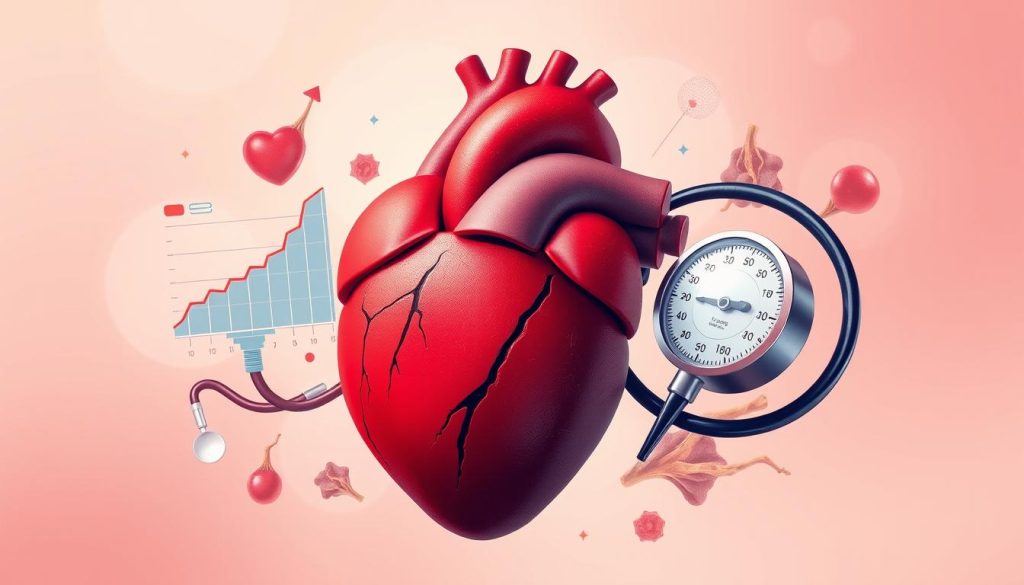
- Thickening of heart muscle
- Narrowing of arteries
- Increased risk of heart attacks
- Higher chances of heart failure
It’s vital to control blood pressure for heart health. Well-managed blood pressure eases the strain on your heart. This lowers your risk of heart disease, stroke, and other serious problems.
“Maintaining healthy blood pressure is one of the most important things you can do for your heart.”
Regular checks and lifestyle changes are key in managing high blood pressure. Keeping your blood pressure in check is a big step towards better heart health. It also reduces your overall risk of heart disease.
Common Signs and Symptoms of Hypertensive Heart Disease
It’s important to know the signs of hypertensive heart disease early. This helps in getting treatment quickly. The heart can show changes from small to big problems.
Early Warning Signs
In the beginning, hypertensive heart disease might not show symptoms. Some people might feel:
- Mild chest discomfort
- Shortness of breath during physical activity
- Fatigue or weakness
- Irregular heartbeat or palpitations
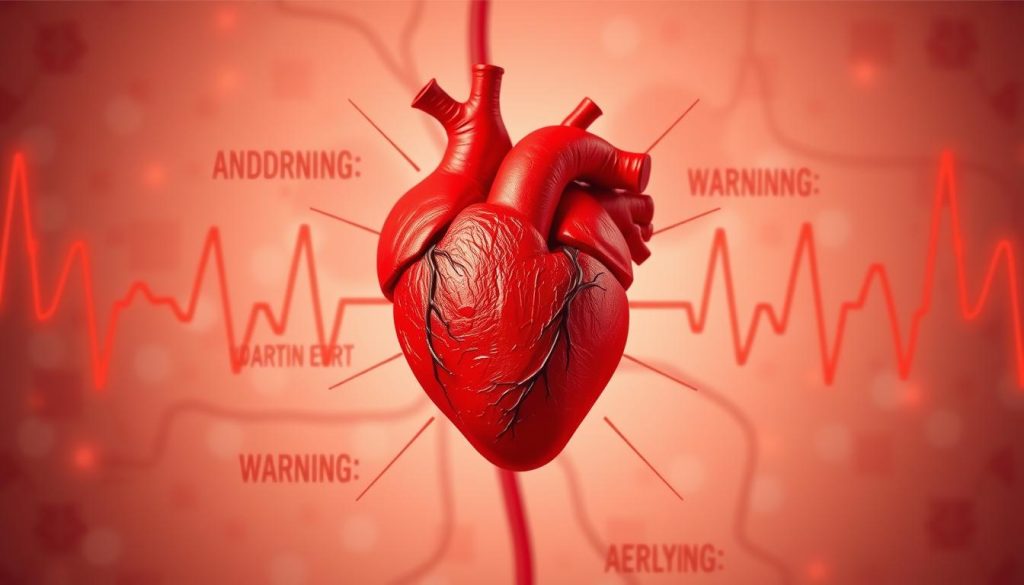
Advanced Symptoms
As it gets worse, more serious symptoms can appear:
- Persistent chest pain or pressure
- Swelling in legs, ankles, or feet
- Difficulty breathing, even at rest
- Dizziness or fainting spells
Emergency Warning Signals
Some symptoms mean you need to get help right away:
| Symptom | Action Required |
|---|---|
| Severe chest pain | Call 911 immediately |
| Sudden shortness of breath | Seek emergency care |
| Loss of consciousness | Call for immediate medical help |
Knowing these signs is key to spotting heart problems early. Quick action and medical care are essential in managing hypertensive heart disease.
Risk Factors Contributing to Hypertensive Cardiovascular Disease
It’s important to know the risk factors for high blood pressure and heart issues. Both things we can change and can’t change play a big role.
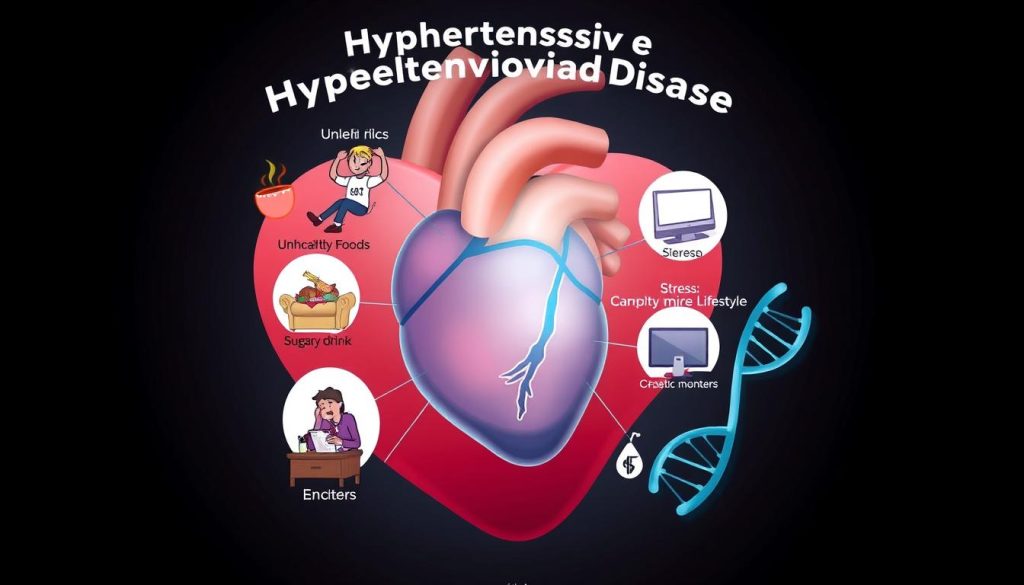
Age and family history are things we can’t change. As we get older, our blood vessels get less flexible. This makes high blood pressure more likely. If your family has a history of high blood pressure, you’re at higher risk too.
Our lifestyle choices also matter a lot. Eating poorly, not exercising, and drinking too much alcohol can harm us. Smoking damages blood vessels and speeds up plaque buildup, raising heart disease risk.
Being overweight and stress are big things we can change. Being too heavy puts extra strain on the heart. Stress can lead to unhealthy habits and hormonal changes that affect blood pressure.
| Risk Factor | Impact on Hypertension | Modifiable? |
|---|---|---|
| Age | Increases risk as you get older | No |
| Family History | Heightens susceptibility | No |
| Poor Diet | Raises blood pressure | Yes |
| Lack of Exercise | Weakens cardiovascular system | Yes |
| Obesity | Strains heart and blood vessels | Yes |
By changing things we can, we can lower our risk of high blood pressure and heart problems. Regular health checks and acting early are key to keeping our hearts healthy.
Diagnosing Hypertensive Heart Conditions
Doctors use many methods to find and check how serious heart problems from high blood pressure are. Let’s look at the main steps in finding these problems.
Medical Examination Procedures
The first step is a detailed physical exam. Your doctor will check your blood pressure and listen to your heart and lungs. They also look for signs of extra fluid and check your pulse for any odd beats.
Diagnostic Tests and Screenings
Many tests help find heart problems linked to high blood. These include:
- Electrocardiogram (ECG)
- Echocardiogram
- Stress tests
- Chest X-ray
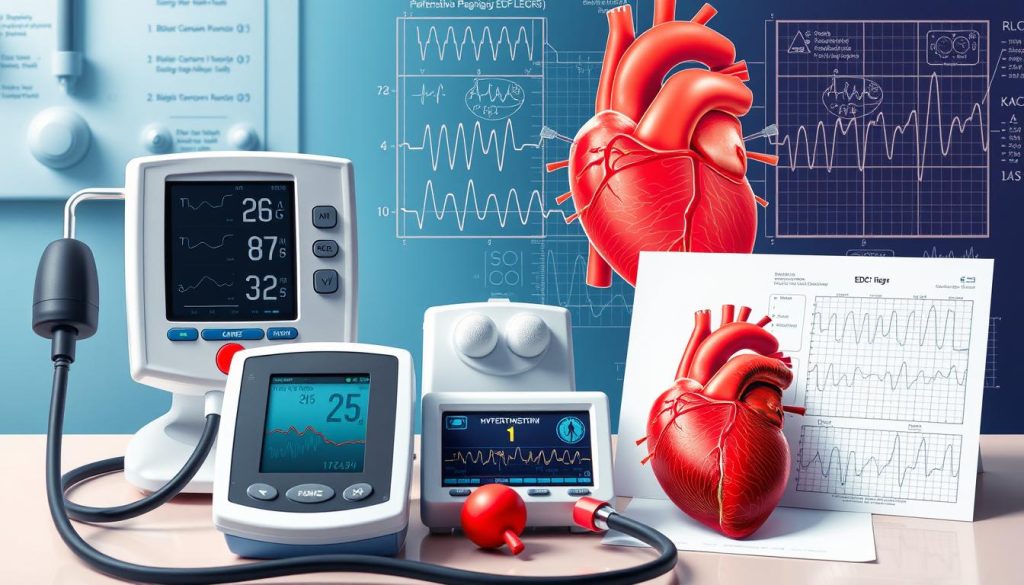
Laboratory Assessments
Blood and urine tests are very important for checking heart health. They show key signs of how well the heart and blood vessels are working.
| Test | Purpose |
|---|---|
| Lipid Panel | Measures cholesterol levels |
| Blood Glucose | Checks for diabetes |
| Kidney Function Tests | Assesses kidney health |
| Thyroid Function Tests | Rules out thyroid disorders |
Finding heart problems early is very important. It helps avoid serious heart issues. Regular check-ups and tests can spot these problems early.
Treatment Options for Managing HCVD
Managing hypertensive cardiovascular disease needs a full plan. Doctors aim to control blood pressure for heart health. Let’s look at the main treatment options.

- Adopting a heart-healthy diet
- Regular exercise
- Stress reduction techniques
- Limiting alcohol intake
- Quitting smoking
When lifestyle changes aren’t enough, drugs are needed. Common drug classes for HCVD treatment include:
| Medication Class | Function | Examples |
|---|---|---|
| ACE inhibitors | Relax blood vessels | Lisinopril, Enalapril |
| Beta-blockers | Slow heart rate | Metoprolol, Atenolol |
| Diuretics | Reduce fluid retention | Furosemide, Bumetanide |
| Calcium channel blockers | Relax arterial walls | Amlodipine, Diltiazem |
In severe cases, surgery might be needed. This includes coronary artery bypass grafting or valve repair surgeries. The goal is to control blood pressure and prevent heart damage.
“Early intervention and consistent management are key to controlling hypertensive cardiovascular disease and improving quality of life.”
Remember, managing hypertensive cardiovascular disease is a long-term effort. Regular check-ups and sticking to treatments are vital for success.
Lifestyle Modifications for Blood Pressure Control
Making lifestyle changes is key to managing hypertensive cardiovascular disease and keeping your heart healthy. Let’s explore some effective ways to control your blood pressure through daily habits.
Dietary Changes and Recommendations
Eating right plays a big role in blood pressure control for heart health. Focus on a diet rich in fruits, vegetables, whole grains, and lean proteins. Cut back on salt, saturated fats, and added sugars. The DASH (Dietary Approaches to Stop Hypertension) diet is a great starting point for many people.
| Food Group | Recommended Servings | Examples |
|---|---|---|
| Vegetables | 4-5 per day | Leafy greens, carrots, broccoli |
| Fruits | 4-5 per day | Apples, berries, oranges |
| Whole Grains | 6-8 per day | Brown rice, whole wheat bread, oatmeal |
| Lean Proteins | 6 or less per day | Fish, poultry, beans |
Exercise and Physical Activity Guidelines
Regular exercise is vital for managing hypertensive cardiovascular disease. Aim for at least 150 minutes of moderate-intensity aerobic activity or 75 minutes of vigorous-intensity aerobic activity per week. Activities like brisk walking, swimming, or cycling can help lower blood pressure and improve heart health.
Stress Management Techniques
Chronic stress can contribute to high blood pressure. Incorporate stress-reducing activities into your daily routine. Try meditation, deep breathing exercises, or yoga. Even simple actions like reading a book or listening to calming music can help manage stress and support your heart health goals.
“Small lifestyle changes can lead to big improvements in managing hypertensive cardiovascular disease. Start with one change at a time, and you’ll be on your way to better heart health.”
Medications and Medical Interventions
Medications are key in treating hypertensive cardiovascular disease. Doctors use various drugs to manage blood pressure and heart issues.
Antihypertensive medications are vital for managing hypertension and heart problems. They work in different ways to lower blood pressure and ease heart strain.
- ACE inhibitors: These drugs relax blood vessels and decrease blood volume.
- Beta-blockers: They slow heart rate and reduce the heart’s workload.
- Calcium channel blockers: These medications relax blood vessel walls.
- Diuretics: They help the body eliminate excess sodium and water.
Doctors might mix different drugs to better control blood pressure. Finding the right medication or mix can take time and may need adjustments.
Other medical steps may be needed for hypertensive cardiovascular disease. These steps can include procedures to tackle specific issues or boost heart function.
“The goal of treatment is not just to lower blood pressure, but to protect the heart and reduce the risk of complications.”
Regular check-ups and monitoring are key to the treatment plan. Your doctor will check how well the medications work and adjust them as needed. This ensures the best care for your condition.
Preventing Hypertensive Cardiovascular Complications
It’s important to prevent heart problems caused by high blood pressure. By using the right steps, you can lower your risk and handle any issues. Let’s look at how to stop heart disease linked to high blood pressure.
Primary Prevention Strategies
Primary prevention is about stopping high blood pressure before it happens. These steps are key to avoiding heart disease:
- Maintain a healthy weight
- Eat a balanced diet rich in fruits and vegetables
- Limit salt intake
- Exercise regularly
- Manage stress through relaxation techniques
- Avoid smoking and excessive alcohol consumption
Secondary Prevention Measures
If you already have high blood pressure, secondary prevention helps stop things from getting worse:
- Take prescribed medications as directed
- Monitor blood pressure at home
- Control other risk factors like diabetes and high cholesterol
- Attend regular check-ups with your healthcare provider
Regular Monitoring Protocols
Regular checks are vital to stop heart problems from high blood pressure. Follow these tips:
| Monitoring Action | Frequency | Importance |
|---|---|---|
| Blood Pressure Check | Daily to Weekly | Track trends and medication effectiveness |
| Doctor’s Visit | Every 3-6 months | Assess overall cardiovascular health |
| Lipid Profile | Annually | Monitor cholesterol levels |
| Electrocardiogram (ECG) | As recommended | Detect heart rhythm abnormalities |
By following these steps and keeping up with regular checks, you can greatly lower your risk of heart problems. This helps keep your heart healthy for a long time.
Long-term Prognosis and Disease Management
Managing hypertensive cardiovascular disease is a lifelong journey. Patients who stick to their treatment plans and make lifestyle changes can greatly improve their outlook. By doing so, they can lessen the long-term impact of high blood pressure on their heart.
- Regular blood pressure checks
- Medication adherence
- Heart-healthy diet
- Regular exercise
- Stress reduction techniques
Those who keep up with these habits often see fewer complications and enjoy a better life. Yet, the ongoing nature of hypertensive cardiovascular disease demands constant attention.
“With proper management, many patients with hypertensive cardiovascular disease can lead full, active lives. It’s about making health a priority every day.”
Outcomes can vary a lot, depending on individual factors and how severe the disease is. Some might face higher risks of heart attacks, strokes, or kidney issues. It’s key to have regular check-ups and talk openly with doctors to catch and tackle any new issues early.
| Management Strategy | Potential Benefits |
|---|---|
| Medication Adherence | Stable blood pressure, reduced heart strain |
| Dietary Changes | Lower cholesterol, weight management |
| Regular Exercise | Improved cardiovascular health, stress reduction |
| Stress Management | Decreased blood pressure spikes, better sleep |
By grasping the long-term effects of high blood pressure on the heart and staying committed to care, patients can manage their condition. This way, they can significantly enhance their overall health outlook.
Latest Research and Advances in HCVD Treatment
Recent years have brought exciting breakthroughs in treating hypertensive cardiovascular disease. Researchers are looking into new ways to manage this complex condition. They are focusing on targeted therapies that target specific molecular pathways involved in blood pressure regulation.
There have also been advancements in how we deliver medications. New drug delivery systems aim to make medications more effective and reduce side effects. For instance, extended-release formulas allow for once-daily dosing. This makes it easier for patients to stick to their treatment plans and keeps their blood pressure stable all day.
The use of artificial intelligence and machine learning is another big step forward. These technologies help doctors analyze large amounts of patient data. This allows them to predict cardiovascular risks more accurately and tailor treatment plans to each patient. This data-driven approach is changing how we manage hypertensive cardiovascular disease, leading to better patient outcomes.
Clinical trials are also exploring new therapies like gene editing and stem cell treatments for HCVD. These are early stages, but they show great promise. As research continues, we might see new treatments for hypertensive cardiovascular disease soon.
FAQ
Q: What is hypertensive cardiovascular disease?
A: Hypertensive cardiovascular disease (HCVD) is a condition where high blood pressure damages the heart and blood vessels. This leads to various heart problems. It causes changes in the heart and arteries due to the strain of high blood pressure.
Q: How does high blood pressure affect heart health?
A: High blood pressure makes the heart work harder. This can cause the heart muscle to thicken and arteries to narrow. It also increases the risk of heart attack, stroke, and heart failure. Over time, it can severely damage the heart and blood vessels.
Q: What are the common symptoms of hypertensive heart disease?
A: Early symptoms may be hard to notice. As it gets worse, symptoms like chest pain and shortness of breath may appear. Other signs include irregular heartbeat, fatigue, and swelling in the legs. It’s important to check blood pressure regularly, as high blood pressure often has no symptoms.
Q: What are the risk factors for developing hypertensive cardiovascular disease?
A: Risk factors include high blood pressure, obesity, and a sedentary lifestyle. High salt intake, alcohol, smoking, diabetes, and high cholesterol are also risks. Age over 65 and family history of heart disease are factors too. While some can’t be changed, many can be improved through lifestyle changes.
Q: How is hypertensive cardiovascular disease diagnosed?
A: Doctors use a medical history review, physical exam, and blood pressure checks to diagnose. They may also do an electrocardiogram (ECG), echocardiogram, and stress tests. Blood tests and imaging studies like CT or MRI scans might also be used to check the heart’s structure and function.
Q: What are the treatment options for managing hypertensive cardiovascular disease?
A: Treatment includes lifestyle changes and medications. Eating a heart-healthy diet, exercising regularly, managing stress, and quitting smoking are key. Medications like ACE inhibitors, beta-blockers, or diuretics may be prescribed. Sometimes, procedures are needed to address specific heart issues.
Q: Can hypertensive cardiovascular disease be prevented?
A: While some risks can’t be changed, many can be reduced. Maintaining a healthy weight, exercising, and managing stress are important. Limiting salt and alcohol, not smoking, and controlling diabetes and high cholesterol help too. Regular blood pressure checks and early intervention are key to prevention.
Q: What is the long-term outlook for someone with hypertensive cardiovascular disease?
A: The outlook depends on the condition’s severity, blood pressure control, and other health issues. With proper management, many people can live active lives. Ongoing care and regular check-ups are necessary to manage the condition effectively.
Q: Are there any new treatments or research developments for hypertensive cardiovascular disease?
A: Research is ongoing, with new medications and devices being developed. Personalized treatments based on genetics are also being explored. Therapies like renal denervation and studies on inflammation in heart disease are promising. These may lead to better treatments in the future.












